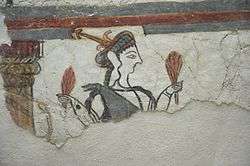Eritha
Eritha (Linear B: E-ri-ta, 13th–12th century BC) was a Mycenaean Greek priestess. She was one of the most significant priestesses in the Mycenaean state of Pylos, in southwestern Peloponnese. Eritha was in charge of a sanctuary dedicated to the goddess Potnia. She was also involved in a dispute with the local authorities over the taxable assets of the sanctuary.

Position in society
In the Mycenaean era, priestesses from Pylos in general controlled land, textiles, as well as male and female personnel. According to the circa 1200 BC records found in the palace of Pylos, Eritha had enough power and appears to have been one of the most significant priestesses in the region.[1] Together with another local priestess, Karpathia, she appears to be of high status in Mycenaean society, probably the same status female clergy enjoyed in Minoan Crete.[2]
Eritha controlled a considerable amount of land and was assisted in her service by sacred servants.[3] She was a priestess of the female divinity Potnia and was in charge of a sanctuary in the area of pa-ki-ja-ne.[4] The latter toponym appears to be located in modern Sphagianes, near Pylos.[5] Eritha, as a representative of this religious institution also appears to be responsible for the economic resources of the sanctuary.[4]
Dispute with the local authorities
Eritha was involved in a dispute with the local communal authorities of Pylos (the damos) due to the legal status of her religious holdings.[6] She claimed that the land of the sanctuary should be exempted from paying taxes.[4] Eritha probably asserted her claim on behalf of the goddess Potnia. Thus, according to her, the land of the sanctuary should have been classified as a privileged one, presumably free of obligations, rather than a regular leasehold subject to taxes.[7] The preserved records in Pylos don't mention the outcome of this dispute. It appears that Eritha's case remained unresolved by the local authorities due to the fact that Pylos and its palace was burnt to the ground by unidentified invaders in the early 12th century BC.[8]
See also
References
Citations
- Olsen 2014, p. 136: "...of the named priestesses, e-ri-ta, whose name should normalize as Eritha, seems to have been the more significant."
- Castleden 2005, p. 85: "It is highly significant...just as in Minoan society."
- Connelly 2007, p. 13.
- Witt, Constanze. "Introduction to Archaeological Studies II". utexas.edu. University of Texas at Austin Classics Department. Archived from the original on 17 July 2015. Retrieved 20 July 2015.
- Castleden 2005, p. 28: "Not far outside the town of Pylos was a cult centre, called Pakijane in the tablets, Sphagianes in modern Greek."
- Heltzer & Lipiński 1988, p. 63.
- Lupack 2011, p. 213.
- Apostolakis 1988, p. 257.
Sources
- Apostolakis, Ioannis (1988) [1987]. "The Justice in the Mycenaean Age Function and Administration". didaktorika.gr (in Greek). Athens: Panteion University of Athens. doi:10.12681/eadd/0875.CS1 maint: ref=harv (link)
- Castleden, Rodney (2005). The Mycenaeans. London and New York: Routledge. ISBN 0-415-36336-5.CS1 maint: ref=harv (link)
- Connelly, Joan Breton (2007). Portrait of a Priestess: Women and Ritual in Ancient Greece. Princeton, NJ: Princeton University Press. ISBN 978-0-69-112746-0.CS1 maint: ref=harv (link)
- Heltzer, M.; Lipiński, E., eds. (1988). Society and Economy in the Eastern Mediterranean (c. 1500–1000 B.C.): Proceedings of the International Symposium held at the University of Haifa from the 28th of April to the 2nd of May 1985. Leuven: Peeters Publishers. ISBN 978-9-06-831135-8.CS1 maint: ref=harv (link)
- Lupack, Susan (April 2011). "Redistribution in Aegean Palatial Societies. A View from Outside the Palace". American Journal of Archaeology. 115 (2): 207–217. doi:10.3764/aja.115.2.0207. Archived from the original on 2015-09-05.CS1 maint: ref=harv (link)
- Olsen, Barbara A. (2014). Women in Mycenaean Greece: The Linear B Tablets from Pylos and Knossos. Hoboken, NJ: Taylor and Francis. ISBN 978-1-31-774795-6.CS1 maint: ref=harv (link)